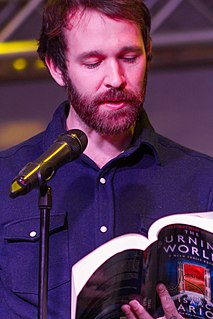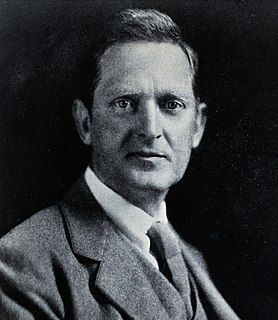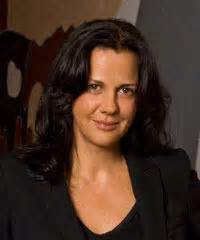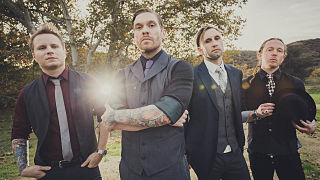A Quote by Isaac Marion
I think the world has mostly ended because the cities we wander through are as rotten as we are. Buildings have collapsed. Rusted cars clog the streets. Most glass is shattered and the wind drifting through the hollow high-rises moans like an animal left to die. I don't know what happened. Disease? War? Social collapse? Or was it just us? The Dead replacing the Living? I guess it's not so important. Once you're arrived at the end of the world, it hardly matters which road you took.
Quote Topics
Animal
Arrived
Because
Buildings
Cities
Collapse
Collapsed
Dead
Die
Disease
Drifting
End
End Of The World
Ended
Glass
Guess
Happened
Hardly
High
Hollow
Important
Just
Know
Left
Like
Living
Matters
Most
Mostly
Once
Rises
Road
Rotten
Shattered
Social
Streets
Think
Through
Took
Us
Wander
War
Which
Wind
World
Related Quotes
A man of my acquaintance once wrote a poem called "The Road Less Traveled", describing a journey he took through the woods along a path most travelers never used. The poet found that the road less traveled was peaceful but quite lonely, and he was probably a bit nervous as he went along, because if anything happened on the road less traveled, the other travelers would be on the road more frequently traveled and so couldn't hear him as he cried for help. Sure enough, that poet is dead.
Infectious disease is one of the few genuine adventures left in the world. The dragons are all dead and the lance grows rusty in the chimney corner. ... About the only sporting proposition that remains unimpaired by the relentless domestication of a once free-living human species is the war against those ferocious little fellow creatures, which lurk in dark corners and stalk us in the bodies of rats, mice and all kinds of domestic animals; which fly and crawl with the insects, and waylay us in our food and drink and even in our love
This is another world to the ones most Australians know. It was explained by my father once that it's like a blanket on the ground. We, the uninitiated, only see the blanket. Lift it up and that's what our elders... see - the real thing - a world most of us will never know or understand. Through their paintings, artists... offer us a glimpse of the world of dreams where the past, present and the future link.
We're all going to go crazy, living this epidemic [AIDS] every minute, while the rest of the world goes on out there, all around us, as if nothing is happening, going on with their own lives and not knowing what it's like, what we're going through. We're living through war, but where they're living it's peacetime, and we're all in the same country.
It's important to remember that World War II was experienced very much as a continuity in that sense. Most of World War II in most of Europe wasn't a war; it was an occupation. The war was at the beginning and the end, except in Germany and the Soviet Union, and even there really only at the end. So the rest of time it's an occupation, which in some ways was experienced as an extension of the interwar period. World War II was simply an extreme form, in a whole new key, of the disruption of normal life that began in 1914.
A lot of people have a hard time living out of a suitcase, being on the road constantly in different cities. For us it's just kind of what we do. You do get homesick. I miss my wife, I miss my home, I miss my dogs, I miss my kitchen, which is something I like to do outside of this is cook. You miss the simple things. But when you look at the big picture we get to see a crazy amount of cities and the people we get to meet, all over the world it kind of makes up for it. It makes you realize how lucky you are because it could be gone tomorrow you just never know.
I saw my town as if I had just arrived. It was as if I was waking up. You see houses and buildings every day, and you walk by them on your way to something else, and you hardly see. You hardly notice they're even there, mostly because there's something else going on right in front of your face, But when the town itself becomes the thing that is going on right in front of your face, it all changes, and you're not just looking at a house, but at what's happened in that house before you were born.





































